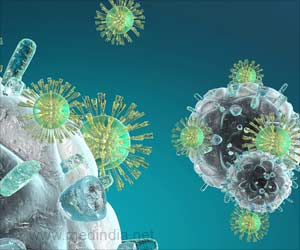The enzyme GSK-3, a target of the mood disorder drug lithium, has a role in controlling alternative splicing in cells, says study.

‘GSK-3 phosphorylated proteins included splicing factors, which splice sections of messenger RNA, changing the proteins that they encode. Absence of GSK-3 changed the splicing patterns of more than 200 messenger RNAs.’





In 1996, Peter Klein of the University of Pennsylvania discovered that one of lithium's biological activities was inhibiting GSK-3, an enzyme that modifies other proteins by attaching phosphate molecules, a process called phosphorylation. Lithium's effect on GSK-3 affected the development of animal cells, but it is still unknown what connection, if any, this has to psychiatric disease. Since then, Klein - now a professor of medicine at the University of Pennsylvania - has been investigating many different aspects of GSK-3 activity. "In this paper, we were trying to find out what proteins in the cell are affected by GSK-3 inhibition," Klein said. "We compared cells with GSK-3 to cells completely lacking GSK-3 to ask how other proteins changed."
"Mood disorders are so multifaceted in terms of the pathways and pathologies involved; it's really difficult to pin down a specific pathway," said Mansi Shinde, a former graduate student in Klein's research group who led the new study. "We said: Let's look at what GSK-3 does, and that would maybe lead us toward what lithium does."
The research team used mass spectrometry to compare phosphorylation of proteins from mouse embryonic stem cells with fully functioning GSK-3 to cells in which the gene encoding GSK-3 had been deleted. The resulting massive dataset is called a phosphoproteome - a comprehensive catalog of proteins that are phosphorylated by GSK-3. Analyzing the data yielded some surprising findings.
Conventional wisdom had suggested that GSK-3 phosphorylates proteins that contain a specific amino acid sequence, but the new phosphoproteome showed that the majority of proteins whose phosphorylation depended on GSK-3 did not contain this sequence. Notably, the phosphorylated proteins included a group called splicing factors, which splice together different sections of messenger RNA, changing the proteins that they encode. Absence of GSK-3 changed the splicing patterns of more than 200 messenger RNAs.
Advertisement
"The effect on the splicing factors and other mutations associated with leukemia was completely surprising to me," Klein said. The group is therefore now pursuing investigations into how GSK-3 affects the growth of healthy and leukemic blood cells.
Source-Eurekalert















